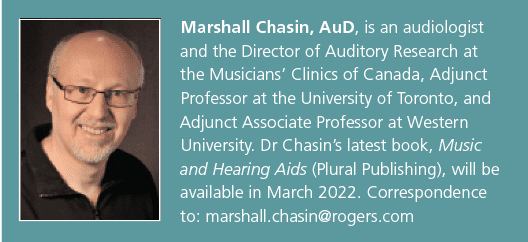Back to Basics | August 2022 Hearing Review
Does lower-level noise play a factor in long-term health consequences?
By Marshall Chasin, AuD
This issue of Hearing Review is about audiology and also not about audiology. Most of the research has been performed by non-audiologists and in many cases, published in high-level, peer-reviewed, but not “mainstream” audiology journals. The topic of how lower levels of environmental noise affects the body has been formally studied since just after WWII, yet has not really shown anything definitive about long-term effects related to sleep disruption, annoyance, or overall stress. The following is from the conclusions section of my lead-off article:
This is admittedly an extremely difficult area of study with a range of many potentially confounding factors and measures that either have poor test-retest reliability or have a poor correlation with sleep disruption, cognitive and educational issues, stress, and general annoyance. For example, noise that may cause the greatest sleep disruptions may be judged as a noise source that is associated with relatively little annoyance.
There are also a range of other either uncontrolled (or unconsidered) phenomena where some people, in some circumstances, and with some types of noise, are more susceptible to its effects than are others. This may be a dose-related effect or even a genetic predisposition.… or not—the literature is unclear on this. And to be fair, this same issue of differential “susceptibility” is observed for some sections of the population even for high levels of noise and/or music exposure for measurable and permanent hearing loss, where, again, the reasons are not well known.
There are no “smoking gun” studies or set of studies, that when taken together definitively describe predictable and associated effects of low-level noise exposures. While many studies do demonstrate changes in some measures, there is no clear evidence that these changes will have long-term consequences.
While it would be tempting to say the sentence “more research needs to be performed,”, given the inherent difficulties in this area of study, it would be unrealistic to conclude that at some point in the near future, definitive and predicted results would be able to be obtained. All that can realistically be said is that for a range of low-level environmental exposures, some people are quite susceptible to its effects, whereas others are not, and these effects can include sleep disruption, potentially cognitive and educational issues, and an increase in stress and annoyance.
Audiologists have traditionally not been involved in the study of systemic effects of lower levels of noise on the body and very few of the studies mentioned in this lead-off article appear in traditional mainstream audiology publications. Yet this appears to be an area where the media has been turning to audiologists for their comments and expertise.
Of interest is that in the history of environmental noise control, Canada was at the forefront of advocacy and Walter Montano from Argentina is quick to point this out in his excellent contribution. Alice Bronzaft has contributed an article on modern forms of advocacy. It should be noted that it was Dr Bronzaft (Bronzaft and McCarthy, 1975)1 who was able to demonstrate in the 1970s that students in an elementary school in New York City whose classroom was on the quiet side of the school performed significantly better on language comprehension and reading tests than matched children whose classrooms were on the noisier side of the school, adjacent to noisy railway tracks. And Pam Millett has contributed an article on the potential effects of typical classroom noise may have on teachers.
While lower levels of environmental noise alone do not cause measurable hearing loss, and it is questionable whether any of its effects are long-term, it is true that environmental noise can degrade one’s quality of life on a number of levels. And, despite the lack of any “smoking gun” studies, lower levels of environmental noise may be one of many factors that do contribute to long-lasting health issues.

Citation for this article: Chasin M. Non-auditory effects of lower-level environmental noise. Hearing Review. 2022;29(8):22-23.
References
- Bronzaft AL, McCarthy DP. The effect of elevated train noise on reading ability. Environment and Behavior. 1975;7(4):517-528.





